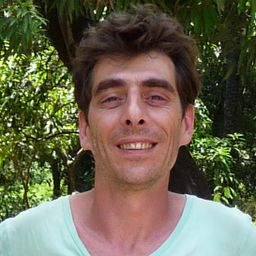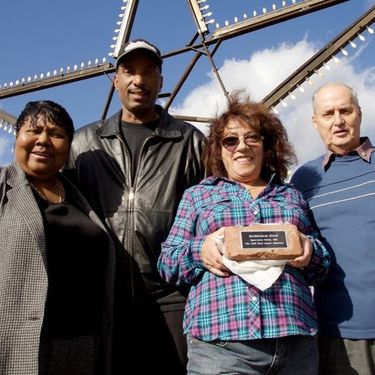
Sessions in which Mathieu Fribault participates
Sunday 5 June, 2016
Sessions in which Mathieu Fribault attends
Friday 3 June, 2016
Working with archival documents and the current-day morphology of the Grey Nuns' site, Dr Cynthia Hammond, Dr Shauna Janssen, in collaboration with Dr Jill Didur, will curate a series of installations and performances that speak directly to the rich heritage of a specific urban landscape: the gardens of the Grey Nuns' Motherhouse, now part of the Concordia University downtown campus. Visitors will have the opportunity to explore the lost working gardens of the Grey Nuns. As with other such...
Saturday 4 June, 2016
Most of what we experience as heritage emerges into conscious recognition through a complex mixture of political and ideological filters, including nationalism. In these processes, through a variety of devices (museums, scholarly research, consumer reproduction, etc.), dualistic classifications articulate a powerful hierarchy of value and significance. In particular, the tangible-intangible pair, given legitimacy by such international bodies as UNESCO, reproduces a selective ordering of cul...
Sunday 5 June, 2016
Inscrite à l’origine dans le cadre d’un projet ANR, « ANTIMOINE » , cette proposition de session suggère une vision novatrice des outils nécessaires à la constitution de savoirs relatifs aux activités humaines situées (anthropologie des territoires), savoirs élaborés à partir d'objets du patrimoine et de leur interprétation (lecture). Eu égard à la réalité caractérisant les systèmes d'informations patrimoniaux qui fonctionnent essentiellement à partir de mots-clés avec une prise en compte ...
Russell Staiff argues that heritage discourse and practice are tightly interwoven with the theoretical legacy of the visual arts, specifically citing the shared concerns of formalism, iconography, aesthetics and modernism (“Heritage and the Visual Arts” 2015). Yet craft, as a field of knowledge, is often subsumed under the visual arts, when in fact its materialities, functionality, concerns about skill and preoccupation with the local (whether understood as geographically or politically const...
Les arts du spectacle, les événements festifs, les rituels, les récits oraux, les savoir-faire font désormais pleinement partie du patrimoine culturel au même titre que les collections d’objets et les monuments. La Convention sur le patrimoine immatériel adoptée en 2003 par l’UNESCO vise à assurer leur reconnaissance culturelle à l’échelle locale, nationale, et internationale, ainsi que leur sauvegarde. Ces pratiques culturelles et artistiques se distinguent toutefois des objets patrimonia...
"What does heritage change?" is a multifaceted question to which the answer(s) are in primary respects related to real-life negotiations among different groups of citizens, cultures, races, ethnic groups, sexual identities, and social classes about received, official and/or widely accepted or accomodated intangible attributes, cultural traditions, historic monuments, buildings, and other transmitted or revived historical legacies. Heritage designated by and for whom, for what motivations, an...
Directed by Tom Fassaert and presented by Marc Jacobs. ___ Doel, a Belgian village near the Dutch border, is disappearing quickly and deliberately. Not because of the four old nuclear reactors on its territory, but because the Flemish government decided that the village might block projects for new docks for the Antwerp harbour, plans developed since the 1960s. In the 21st century this process of officially encouraged depopulation is coming to an end: 2500 inhabitants i...
Monday 6 June, 2016
Questions about the repatriation of cultural property, issues of access and exclusion in the World Heritage system, intangible heritage practices in conflict with human rights norms, or the ways in which the international human rights regime is interpreted as a form of cultural heritage itself: rights are now considered relevant in a broad variety of heritage situations. This is reflected in the incorporation of references to human rights in a series of key international heritage-relate...
This session will address the potential and limitations of heritage as a tool for leverage, empowerment and dissent in Africa. It is widely acknowledged that heritage—the selective valuation and use of the past in the present—can be an oppressive. Heritage work in Africa has even been characterized as "an instrument for dictatorship" (Peterson et al. 2015:28) because it is often implicated in upholding particular narratives and political orders, imposing a singular vision onto a heterog...
Heritage processes vary according to cultural, national, geographical and historical contexts. Since the late 1980s, the phenomenon of contestation in heritage has been increasingly recognized. However, there is still little detailed and situated knowledge about the range of actors present in contestations, the variety of strategies they pursue, the reasoning behind their choices, the networks they develop, and how, from all this, heritage has been and is constructed. More often than not, con...
De l’ère du Maire Drapeau et de ses interventions autoritaires sur le tissu urbain de Montréal dans les années 1960 et 1970, à l’instauration d’une démocratie municipale dans les années 1980 sous l’administration Doré, la population est de plus en plus sollicitée dans les grands débats concernant la transformation du patrimoine urbain de Montréal (Drouin 2005). Notons l’instauration en 2002 de l’Office de consultation publique de Montréal, tribune où les citoyens peuvent donner leurs avis ...
Directed by William Shewbridge and Michelle Stefano USA; 35 mins Presented by Michelle Stefano ___ After 125 years of operation, the Sparrows Point Steel Mill (Baltimore, Maryland) finally closed its doors in 2012. The film, “Mill Stories”, examines the importance of the mill from the perspectives of former workers and community members while connecting their story to the larger narrative of industrial boom and bust. The film seeks to amplify the voices of forme...
Directed by Christine Walley and Chris Boebel Presented by Michelle Stefano When the steel mills began closing on Chicago's Southeast Side, residents could feel the American Dream slipping away. Decades later, the loss of the steel industry has left permanent scars. The documentary film, Exit Zero: An Industrial Family Story, is named for the highway exit number for Chicago’s old steel mill neighbourhoods and captures the feeling of a region passed over. In poignant and some...
Tuesday 7 June, 2016
Fleur dans le fleuve (COHDS, 2012 - French) – À chaque année, en avril, la communauté rwandaise de Montréal se réunit pour commémorer les centaines de milliers d’homme, femmes et enfants qui ont été assassinés pendant le génocide de 1994. La marche audioguidée emprunte le parcours de la commémoration, de la station de métro Berri-UQAM (au coin des rues Berri et Ste-Catherine) jusqu’à la tour de l’Horloge qui surplombe le fleuve St-Laurent, dans le Vi...
As the interface between past and present, heritage is deeply involved in articulations of personal and group identity, working to unite and harmonize group relations, and, simultaneously causing frictions, fractions, and violence. Critical heritage theory reveals that values and approaches to heritage are articulated both within and across regions (such as Asia, or Europe). A vital, and as yet unanswered, question centres on the degree to which heritage in Asia fundamentally differs from ...
Dans la tradition occidentale, le patrimoine culturel trouverait ses fondements «dans le concept chrétien de l’héritage sacré de la foi» (Babelon et Chastel 1994), dont la conservation des objets religieux sous l’Antiquité et le culte des reliques seraient les prémices. Posant alors le principe du «transfert de sacralité», on emprunta le vocabulaire et les techniques du premier pour construire le second, qualifiant ainsi le fait patrimonial comme le culte laïc des productions humaines. Le sac...
While intangible cultural heritage is an important factor in maintaining cultural diversity in the face of growing globalization, there is still little appreciation of its value. UNESCO endorsed the importance of intangible cultural heritage not only as a cultural manifestation but also, and more importantly, as a wealth of knowledge and skills that are transmitted through generations. We invite paper contributions that address multiple ways of understanding, recognizing, valuing, and p...
Le concept de patrimoine culturel immatériel (PCI) a fait l’objet de nombreux colloques et publications depuis la promulgation de la Convention pour la sauvegarde du patrimoine culturel immatériel de l’UNESCO en 2003, voire même avant. Toutefois, peu d’entre eux se sont attardés à la question de l’impact réel des systèmes et politiques mis en place pour favoriser le développement des pratiques culturelles transmises de génération en génération comme les arts et l’artisanat traditionnels, les ...








